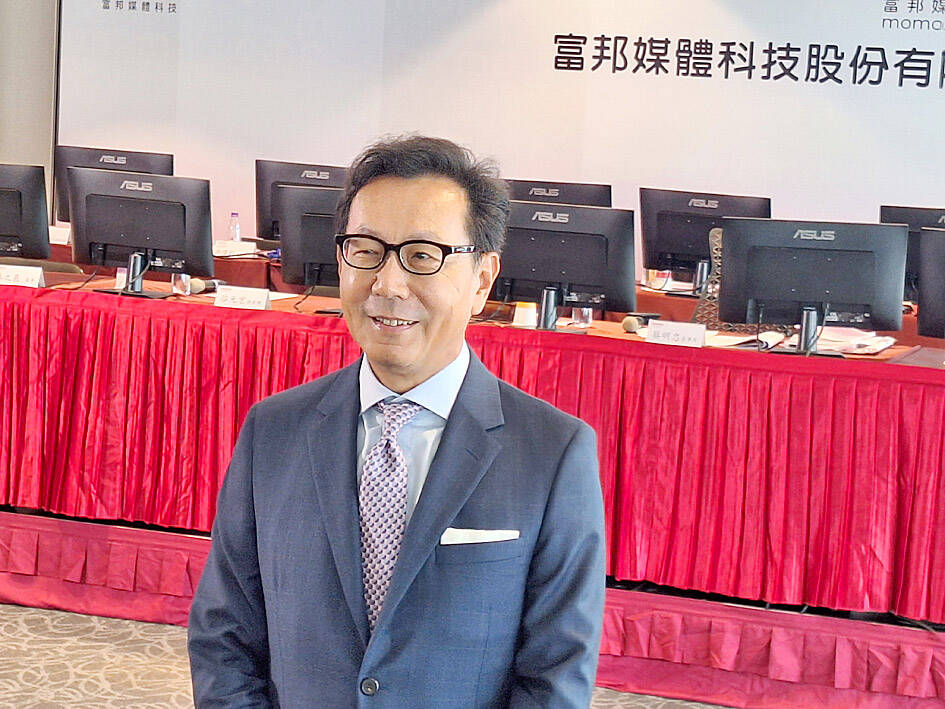Momo.com Inc (富邦媒體), the nation’s leading online and TV retailer, is hoping for a better second half of this year, as it waits for new businesses to bear fruit, company chairman Daniel Tsai (蔡明忠) said yesterday.
“The company’s report card last year was not satisfactory, but acceptable. However, the pressure in the first half of this year remains large,” cable TV station USTV quoted Tsai as saying at the company’s annual general meeting in Taipei.
Momo.com, a retail subsidiary of Taiwan Mobile Co (台灣大哥大), operates an online shopping network, a TV home shopping division and a catalog shopping business. It posted record revenue of NT$112.56 billion (US$3.76 billion) last year, up 3 percent from a year earlier.

Photo: CNA
However, revenue in the first quarter fell 1.76 percent year-on-year, or 21.1 percent quarter-on-quarter, to NT$26.41 billion.
Sales in its business-to-customer operations, which accounted for 97 percent of total revenue, dropped 1 percent year-on-year to NT$2.55 billion, the first annual decline in the company’s history.
That came amid weakening momentum for online consumption during the post-COVID-19 pandemic period, as well as fierce competition with local and foreign e-commerce peers, the company said.
The increase in operating expenses dragged down the company’s operating margin to 2.98 percent in the first quarter, down 1.18 percentage points from a year earlier.
Net profit was NT$859.59 million in the quarter, also down 5.5 percent annually, with earnings per share of NT$3.41, company data showed.
As the nation’s e-commerce penetration rate is about 13 percent, much lower than in neighboring South Korea, there is still ample room to develop that business in Taiwan, Tsai said, adding that achieving a 20 percent penetration rate is achievable in the near future.
Faced with aggressive competition from foreign e-commerce operators, including South Korea’s Coupang Corp, Momo.com has teamed up with Meta Platforms Inc to integrate e-commerce and social media platforms and develop a retail media network for advertising.
In addition, the company has introduced a new business-to-business-to-consumer model through its “mo-shop+” platform, which enables third-party sellers to offer products to consumers through the Momo platform. It also operates a live broadcast business and opened a logistics center in Tainan, while constructing another in central Taiwan, as the company aims to expand its operations.
While the new businesses are expected to help improve Momo.com’s gross merchandise value and operating margin in the long term, it would take time for them to make significant contributions in the short term, due to the high initial investment costs and the need for larger internal integration efforts, Tsai said.
Moreover, US President Donald Trump’s trade and tariff policies also create uncertainty in the global marco climate, he said.
“Tariffs ... and the appreciation of the New Taiwan dollar have made consumers more conservative about the economy, making them more cautious about spending,” which have in turn affected the e-commerce business, Tsai was quoted as saying. “Momo faces greater challenges in the second half of the year.”
Shareholders yesterday approved the company’s proposal to distribute a dividend of NT$13.3 per share — which comprises a cash dividend of NT$12.8 and NT$0.5 from capital surplus, representing a payout ratio of 97.15 percent based on earnings per share of NT$13.69 last year.

Nvidia Corp chief executive officer Jensen Huang (黃仁勳) on Monday introduced the company’s latest supercomputer platform, featuring six new chips made by Taiwan Semiconductor Manufacturing Co (TSMC, 台積電), saying that it is now “in full production.” “If Vera Rubin is going to be in time for this year, it must be in production by now, and so, today I can tell you that Vera Rubin is in full production,” Huang said during his keynote speech at CES in Las Vegas. The rollout of six concurrent chips for Vera Rubin — the company’s next-generation artificial intelligence (AI) computing platform — marks a strategic

Enhanced tax credits that have helped reduce the cost of health insurance for the vast majority of US Affordable Care Act enrollees expired on Jan.1, cementing higher health costs for millions of Americans at the start of the new year. Democrats forced a 43-day US government shutdown over the issue. Moderate Republicans called for a solution to save their political aspirations this year. US President Donald Trump floated a way out, only to back off after conservative backlash. In the end, no one’s efforts were enough to save the subsidies before their expiration date. A US House of Representatives vote

REVENUE PERFORMANCE: Cloud and network products, and electronic components saw strong increases, while smart consumer electronics and computing products fell Hon Hai Precision Industry Co (鴻海精密) yesterday posted 26.51 percent quarterly growth in revenue for last quarter to NT$2.6 trillion (US$82.44 billion), the strongest on record for the period and above expectations, but the company forecast a slight revenue dip this quarter due to seasonal factors. On an annual basis, revenue last quarter grew 22.07 percent, the company said. Analysts on average estimated about NT$2.4 trillion increase. Hon Hai, which assembles servers for Nvidia Corp and iPhones for Apple Inc, is expanding its capacity in the US, adding artificial intelligence (AI) server production in Wisconsin and Texas, where it operates established campuses. This

US President Donald Trump on Friday blocked US photonics firm HieFo Corp’s US$3 million acquisition of assets in New Jersey-based aerospace and defense specialist Emcore Corp, citing national security and China-related concerns. In an order released by the White House, Trump said HieFo was “controlled by a citizen of the People’s Republic of China” and that its 2024 acquisition of Emcore’s businesses led the US president to believe that it might “take action that threatens to impair the national security of the United States.” The order did not name the person or detail Trump’s concerns. “The Transaction is hereby prohibited,”